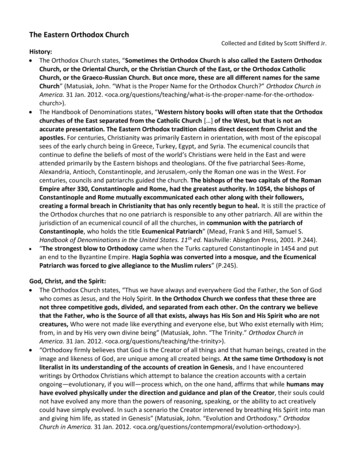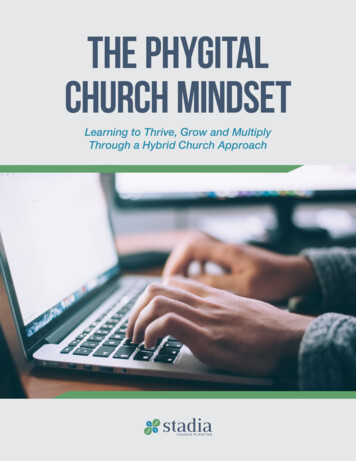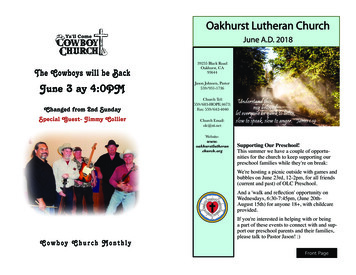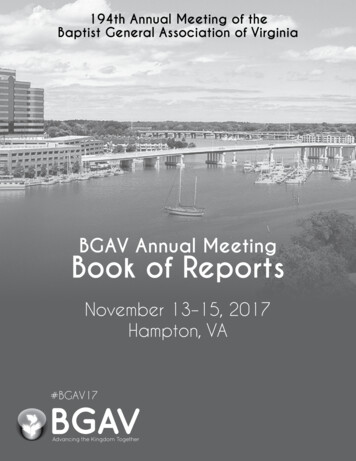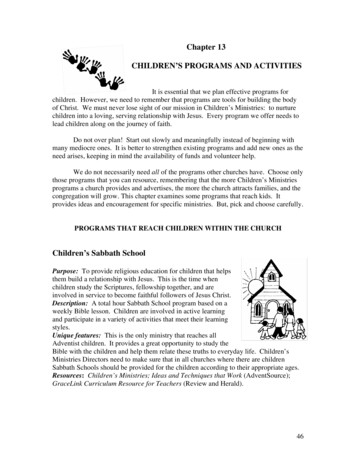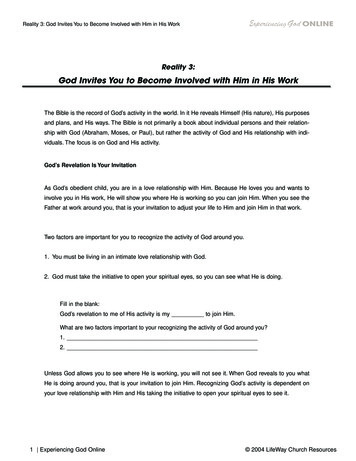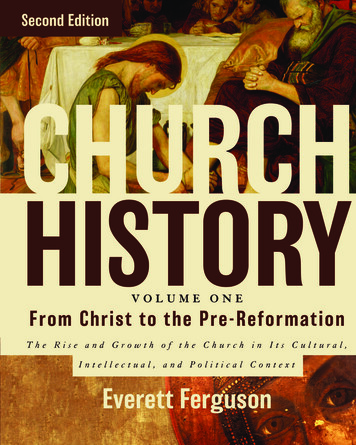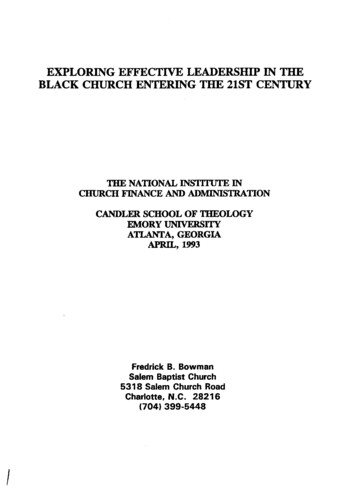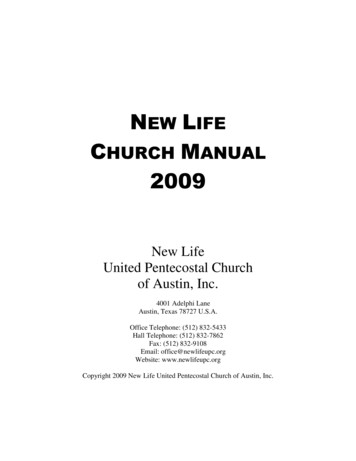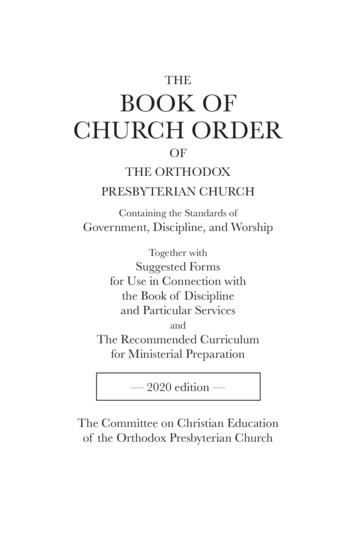
Transcription
THEBOOK OFCHURCH ORDEROFTHE ORTHODOXPRESBYTERIAN CHURCHContaining the Standards ofGovernment, Discipline, and WorshipTogether withSuggested Formsfor Use in Connection withthe Book of Disciplineand Particular ServicesandThe Recommended Curriculumfor Ministerial Preparation— 2020 edition —The Committee on Christian Educationof the Orthodox Presbyterian Church
2020 by The Orthodox Presbyterian ChurchThe Form of GovernmentFirst published 1937Revised 1978, 1979, 1982, 1983, 1984, 1986,1987, 1988, 1989, 1990, 1991, 1992, 1995, 2000, 2005, 2011, 2015The Book of DisciplineFirst published 1940Revised 1983, 1985, 1988, 1989, 1991, 1995, 2005, 2011The Directory for the Public Worship of GodFirst published 1939Revised 1988, 1991Thoroughly revised, 2011Printed in USAIssued by the Stated Clerk of the General AssemblyPublished by and available from:The Committee on Christian Educationof the Orthodox Presbyterian Church607 N. Easton Road, Bldg. EWillow Grove, PA 19090-2539Phone 215/830-0900Order online at store.opc.org
ContentsPreface.vii.THE FORM OF GOVERNMENTI. Christ, the King and Head of the Church.1II. The Church.3III. The Nature and Exercise of Church Power.4IV. The Unity of the Church.6V. Offices in the Church.8VI. Ministers or Teaching Elders.9VII. Evangelists.10VIII. Pastors. 11IX. Teachers.12X. Ruling Elders.13XI. Deacons.14XII. Governing Assemblies.16XIII. The Local Church and Its Session.17XIV. The Regional Church and Its Presbytery.20XV. The Whole Church and Its General Assembly.23XVI. Congregational Meetings.26XVII. Congregations without Pastors.28XVIII. Moderators.29XIX. Clerks.30XX. Ordination and Installation.31XXI. Licensing Candidates to Preach the Gospel.33XXII. Calling a Minister.37XXIII. Ordaining and Installing Ministers.44XXIV. Dissolving Ministerial Relationships.64XXV. Electing, Ordaining, and Installing Ruling Eldersand Deacons.67XXVI. Divesting from Office.75XXVII. Missions.78iii
XXVIII.XXIX.XXX.XXXI.XXXII.Ministers Laboring outside the Church.79Organizing and Receiving Congregations.81Organizations of Members of the Church.86Incorporation and Corporations.87The Constitution and Its Amendment.89THE BOOK OF DISCIPLINEI. The Nature and Purposes of Discipline.91II. Jurisdiction.92III. Steps in the Institution of Judicial Process.98IV. The Trial of Judicial Cases.102V. Cases without Full Process.110VI. Censure and Restoration.112VII. Appeals.116VIII. Dissents and Protests.118IX. Complaints.119THE DIRECTORY FOR THE PUBLIC WORSHIP OF GODPreface.121I. The Principles of Public Worship.123II. Elements of Ordinary Public Worship.133III. The Administration of the Sacraments.141IV. Public Reception of Church Members.156V. Special Occasions of Public Worship.167SUGGESTED FORMS FOR USE IN CONNECTIONWITH THE BOOK OF DISCIPLINEI. Charge and Specifications.169II. Citation of Accused.170III. Citation of Witness.171IV. Notice of Intention to Appeal (in Judicial Cases).172V. Appeal (in Judicial Cases).173VI. Complaint.174VII. Appeal (in Administrative Cases).175VIII. The Public Imposition and Removal of Censures.176iv
SUGGESTED FORMS FOR PARTICULAR SERVICESI. The Solemnization of Marriage.181II. The Burial of the Dead.189III. Thanksgiving for a Church Building.207THE RECOMMENDED CURRICULUMFOR MINISTERIAL PREPARATIONIN THE ORTHODOX PRESBYTERIAN CHURCH.213Index.221v
PrefaceThe Orthodox Presbyterian Church is governed by three sets ofdocuments: its primary, secondary, and tertiary standards (cf. Formof Government, Chapter XXXII, Section 1). The primary standardof the Church is the Word of God, contained in the sixty-six booksof the Old and New Testaments. Standing above the Church’s constitution, the Word of God is “the only rule to direct us how we mayglorify and enjoy him” (Shorter Catechism, Q/A 2). Subordinate tothe Word of God is the constitution, consisting of two sets of standards. The doctrinal standards of the Church (the Confession ofFaith and Catechisms of the Orthodox Presbyterian Church) are itssecondary standards, and the standards of government, discipline,and worship comprise its tertiary standards.The book that you hold in your hand contains the tertiary standards of the Orthodox Presbyterian Church: its Form of Government, Book of Discipline, and Directory for the Public Worship ofGod. While printed separately from the secondary standards, theyare not conceived, nor should they be used, in isolation from them.Several sections of the doctrinal standards refer directly or indirectlyto worship and ecclesiology, such as those dealing with the sufficiency of Scripture, Christian liberty and liberty of conscience, religiousworship and the Sabbath day, the civil magistrate, the church, thesacraments, church censures, and synods and councils.The genius of Presbyterian church government lies in its appreciation for the value of such tertiary standards. They do not replaceor compete with the Scriptures. Rather, they set forth rules and procedures by which the church corporately interprets and applies theWord of God. That is, this Book of Church Order provides the effectivemeans by which the teaching of Scripture is applied to the Orthodox Presbyterian Church’s government, discipline, and worship. AsPresbyterians have put this in the past, a book that rightly orders thevii
church is not necessary for the being of the church (since there aretrue churches that do not follow these rules and procedures), but isnecessary for the well-being of the church. The rules and proceduresset forth in this book will promote and encourage the spiritual healthof the Orthodox Presbyterian Church.The differences in authority among the primary, secondary, andtertiary standards come to expression in two important respects.First, the language of the church officer ordination vows takes intoaccount the relative weight of these standards. Ministers, elders, anddeacons in the Orthodox Presbyterian Church are required to believethe Bible as the only infallible rule of faith and practice, to sincerelyreceive and adopt the Confession of Faith and Catechisms as containingthe system of doctrine taught in Scripture, and to approve of the government, discipline, and worship of this Church. There is a lesseningof the required commitment to the lower levels of these standards.Second, the standards are distinguished by the processes by whichamendments may be made to them. The primary standard of Scripture cannot be altered, the secondary standards of doctrine may beamended only with difficulty and rarely, and the tertiary standardsof church order may be more easily and frequently revised.This 2020 edition of The Book of Church Order of the Orthodox Presbyterian Church represents the current understanding of what thisbranch of the church believes the Scriptures teach about the government, discipline, and worship of the church of the Lord Jesus Christ.It was in 1941, five years after the founding of the Orthodox Presbyterian Church, that its General Assembly ordered the first edition ofThe Book of Church Order to be printed. In 1979 the General Assemblyapproved a substantially rewritten Form of Government. A majorrevision of the Book of Discipline was adopted in 1983. Beginningin 1995, further approved changes to these tertiary standards couldordinarily come into effect only in years ending in 5 or 0. And theGeneral Assembly completed a sixty-two-year process of revisingthe Directory for the Public Worship of God by authorizing thepublication of a special edition of these standards of government,discipline, and worship in 2011 (instead of 2010).viii
This edition of The Book of Church Order has been prepared inaccordance with instructions of the General Assembly, in consultation with the stated clerk of the Assembly. The Committee onChristian Education has taken on the responsibility of publishingand distributing the book. Since the publication of the 2015 edition,no amendments have been made to any of these tertiary standards,though a few grammatical corrections have been made. In accordance with the Form of Government, Chapter XXXII, Section 2,this particular edition of the book will remain in use in the Orthodox Presbyterian Church until at least 2025.Ross W. Graham, stated clerkWillow Grove, PennsylvaniaNovember 2019ix
TheForm of GovernmentChapter IChrist, the King and Head of the Church1. Jesus Christ, upon whose shoulders the government is, whosename is called Wonderful Counselor, the Mighty God, the Everlast ing Father, the Prince of Peace, of the increase of whose government and peace there shall be no end, upon the throne of David,and upon his kingdom, to order it, and to establish it with judgmentand justice, from henceforth even forever, having all power givenunto him in heaven and in earth by the Father, who raised him fromthe dead, and set him at his own right hand, far above all principality and power, and might and dominion, and every name that isnamed, not only in this world but also in that which is to come, andput all things under his feet, and gave him to be the head over allthings to the church, which is his body, the fullness of him that fillsall in all; he being ascended up far above all heavens, that he mightfill all things, received gifts for his church and gave offices necessaryfor the building of his church, for making disciples of all nations andperfecting his saints.2. There is therefore but one King and Head of the church, theonly Mediator between God and man, Jesus Christ, who rules in hischurch by his Word and Spirit. His mediatorial office includes allthe offices in his church. It belongs to his majesty from his throne ofglory not only to rule his church directly but also to use the ministryof men in ruling and teaching his church through his Word andSpirit, thus exercising through men his own authority and enforc1
I, 2Form of Governmenting his own laws. The authority of all such ministerial office restsupon his appointment, who has ordained government in his church,re vealed its nature to us in his Word, and promised his presence inthe midst of his church as this government is exercised in his name.3. Christ orders his church by the rule of his Word; the pattern of officers, ordinances, government, and discipline set forth inScrip ture is therefore to be observed as the instruction of the Lord.Church government must conform to the scriptural pattern and follow the specific provisions revealed in the New Testament. In thosecircumstances not specifically ordered by Scripture the church mustobserve the general rules of the Word. Among the bib lical admonitions applicable to all circumstances are those re quiring that allthings must be done decently, in order, and for edifi cation. A particular form of church government is bound to set forth what Christrequires for the order of his church and to arrange par ticular circumstances only in the manner, to the degree, and for the purposesthat the Lord of the church has appointed in Scripture. The presbyterian form of government seeks to fulfill these scriptural requirements for the glory of Christ, the edification of the church, and theenlargement of that spiritual liberty in which Christ has set us free.Nevertheless, while such scriptural government is necessary for theperfection of church order, it is not essential to the existence of thechurch visible.4. Jesus Christ, having ascended into heaven, abides in hischurch by the Holy Spirit whom he has sent. Through his Spirithe has given his Word revealing his ordinances; through the Spiritalso he exerts his saving and governing power in the teaching of hisWord and the administration of his ordinances. Only by the giftsand calling of the Spirit are men endued and qualified for office inChrist’s church.2
Form of GovernmentII, 4Chapter IIThe Church1. Jesus Christ, being now exalted far above all principality andpower, has erected in this world a kingdom, which is his church.2. The universal church visible consists of all those persons, inevery nation, together with their children, who make profession ofsaving faith in the Lord Jesus Christ and promise submission to hiscommandments.3. In accordance with the teaching of Scripture, the manymembers of this church universal are to be organized in local andregional churches, confessing a common faith and submitting to acommon form of government.4. The work of the church, in fellowship with and obedience toChrist, is divine worship, mutual edification, and gospel witness. Themeans appointed by Christ through which the church does this workinclude the confession of the name of Christ before men; the exercise of fellowship in encouraging one another; the reading, teaching,and preaching of the Word of God; praying; singing; fasting; administering baptism and the Lord’s Supper; collecting and distributing offerings; showing mercy; exercising discipline; and blessing thepeople.3
III, 1Form of GovernmentChapter IIIThe Nature and Exercise of Church Power1. The power which Christ has committed to his church is notvested in the special officers alone, but in the whole body. All believers are endued with the Spirit and called of Christ to join in theworship, edification, and witness of the church which grows as thebody of Christ fitly framed and knit together through that which every joint supplies, according to the working in due measure of eachpart. The power of believers in their general office includes the rightto acknowledge and desire the exercise of the gifts and calling ofthe special offices. The regular exercise of oversight in a particularcongregation is discharged by those who have been called to suchwork by vote of the people.2. Those who join in exercising ecclesiastical jurisdiction are theministers of the Word or teaching elders, and other church governors, commonly called ruling elders. They alone must exercise thisauthority by delegation from Christ, since according to the NewTestament these are the only permanent officers of the church withgifts for such rule. Ruling elders and teaching elders join in congregational, presbyterial, and synodical assemblies, for those who sharegifts for rule from Christ must exercise these gifts jointly not only inthe fellowship of the saints in one place but also for the edificationof all the saints in larger areas so far as they are appointed thereto inan orderly manner, and are acknowledged by the saints as those setover them in the Lord.Government by presbyters or elders is a New Testament ordinance; their joint exercise of jurisdiction in presbyterial assemblies isset forth in the New Testament; and the organization of subordinateand superior courts is founded upon and agreeable to the Word ofGod, expressing the unity of the church and the derivation of ministerial authority from Christ the Head of the church.3. All church power is only ministerial and declarative, for the4
Form of GovernmentIII, 5Holy Scriptures are the only infallible rule of faith and practice. Nochurch judicatory may presume to bind the conscience by makinglaws on the basis of its own authority; all its decisions should befounded upon the Word of God. “God alone is Lord of the conscience, and hath left it free from the doctrines and commandmentsof men, which are, in anything, contrary to his Word; or beside it,if matters of faith, or worship” (Confession of Faith, Chapter XX,Section 2).4. All church power is wholly moral or spiritual. No church officers or judicatories possess any civil jurisdiction; they may not inflictany civil penalties nor may they seek the aid of the civil power in theexercise of their jurisdiction further than may be necessary for civilprotection and security.5. Nevertheless, church government is a valid and authentic jurisdiction to which Christians are commanded to submit themselves.Therefore the decisions of church officers when properly renderedand if in accord with the Word of God “are to be received withreverence and submission; not only for their agreement with theWord, but also for the power whereby they are made, as being anordinance of God appointed thereunto in his Word” (Confession ofFaith, Chapter XXXI, Section 2).5
IV, 1Form of GovernmentChapter IVThe Unity of the Church1. Since the church of Christ is one body, united under and inone God and Father, one Lord, and one Spirit, it must give diligenceto keep this unity in the bond of peace. To this end the church mustreceive those endued with gifts of Christ as Christ himself, must submit to those whose call to govern in the church has been properlyacknowledged, and in particular must learn of those with gifts ofteaching the Word of God. Further, since every Christian is enduedwith some gift for the edification of the body, he must minister thisgift to the church as a faithful steward. Church government mustmaintain this fellowship in Christ and in the gifts of the Spirit andseek its restoration when it has been disrupted through schism.2. It is the right and duty of those who rule in the church of Godto maintain order and exercise discipline, for the preservation bothof truth and duty. These officers and the whole church must censureor cast out the erroneous or scandalous, always observing the requirements of the Word of God, and seeking the honor of Christ’sname, the good of his church, and the reclamation of the offender.3. The manifestation of the unity of the church requires that itbe separate from the world. Apostasy in faith and life is destructiveof the fellowship in Christ; only by rejecting such error can Christian fellowship be maintained. There are many antichrists, manyfalse apostles and teachers. From these the church must turn away,and those who steadfastly hear the voice of false shepherds and follow them cannot be regarded as the sheep of Christ. There are organizations which falsely call themselves churches of God, and otherswhich once were churches, but have become synagogues of Satan.Communion with such is spiritual adultery and an offense againstChrist and his saints.4. The visible unity of the Body of Christ, though not altogether6
Form of GovernmentIV, 4destroyed, is greatly obscured by the division of the Christian churchinto different groups or denominations. In such denominationsChristians exercise a fellowship toward each other in doctrine, worship, and order that they do not exercise toward other Christians.The purest churches under heaven are subject both to mixture anderror, and some have gravely departed from apostolic purity; yet allof these which maintain through a sufficient discipline the Word andsacraments in their fundamental integrity are to be recognized astrue manifestations of the church of Jesus Christ. All such churchesshould seek a closer fellowship, in accordance with the principles setforth above.7
V, 1Form of GovernmentChapter VOffices in the Church1. Our Lord Jesus Christ established his church of the new covenant on the foundation of the apostles and prophets. The apostleswere appointed to be witnesses to the risen Christ, testifying in theHoly Spirit to what they had seen and heard, heralding the gospel tothe world, and grounding the church in the teaching of Christ. Together with the prophets they spoke by revelation, recording in theScriptures of the New Testament the fullness of the truth as it is inChrist Jesus. When their testimony was completed, their calling andoffice were not continued in the church and the powers and signsthat endued and sealed their ministry ceased.2. Our Lord continues to build his church through the ministryof men whom he calls and endues with special gifts for teaching,ruling, and serving. Some of these special gifts can be most profitably exercised only when those who possess them have been publiclyrecognized as called of Christ to minister with authority. It is properto speak of such a publicly recognized function as an office, and todesignate men by such scriptural titles of office and calling as evangelist, pastor, teacher, bishop, elder, or deacon. There are diversitiesof ministry within any office, for every man is called to be a stewardof his own gifts. At the same time, a general designation of officemay be applied to a group of functions within which separate officescould be distinguished.3. The ordinary and perpetual offices in the church are thosegiven for the ministry of the Word of God, of rule, and of mercy.Those who share in the rule of the church may be called elders(presbyters), bishops, or church governors. Those who minister inmercy and service are called deacons. Those elders who have beenendued and called of Christ to labor also in the Word and teachingare called ministers.8
Form of Government VI, 4Chapter VIMinisters or Teaching Elders1. The ministry of the Word is a calling of God to stewardship inthe gospel. In this ministry there is a diversity of gifts that are essential to the discharge of evangelistic, pastoral, and teaching functions.2. Every minister of the Word, or teaching elder, must manifesthis gifts and calling in these various aspects of the ministry of thegospel and seek by full exercise of his ministry the spiritual profitof those with whom he labors. As a minister or servant of Christ itis his duty to feed the flock of God, to be an example to them, tohave oversight of them, to bear the glad tidings of salvation to theignorant and perishing and beseech them to be reconciled to Godthrough Christ, to exhort and convince the gainsayer by sound doctrine, and to dispense the sacraments instituted by Christ. Amongthose who minister the Word the Scripture distinguishes the evangelist, the pastor, and the teacher.3. He who fills this office shall be sound in the faith, possess competency in human learning, and be able to teach and rule others. Heshould exhibit holiness of life becoming to the gospel. He should bea man of wisdom and discretion. He should rule his own house well.He should have a good report of them that are outside the church.4. Every minister shall be a member of a regional church andhas communicant fellowship in any local congregation of that regional church. The presbytery, with the concurrence of a ministerialmember, may request a session within its bounds to exercise pastoralcare over him in its behalf. A session, with the concurrence of thepresbytery, may grant the right to vote in the congregation to anyministerial member of the regional church.9
VII, 1Form of GovernmentChapter VIIEvangelists1. Jesus Christ, to whom is given all power in heaven and inearth, has commanded his church to make disciples of all the nations. From the throne of his glory he sent forth the Holy Spirit,the promise of the Father, to empower the witness of the churchto the gospel. While it is the calling of every believer to confessChrist before men, and while God gives particular gifts and calling to some to minister the Word, and while every minister of theWord must evangelize in the fulfillment of his calling, there are somewho are particularly called by Christ and his church as evangelists.Ordinarily such men shall preach the Word free of pastoral chargein a particular flock in order that they may labor to bring in othersheep. And to those sheep whom Christ has brought in, evangelistsshall administer the sacraments until a congregation shall have beenregularly organized. Since the gifts and functions of evangelists arenecessary until the end of the age, this ministry is permanent andnot confined to the apostolic period.2. The evangelist, in common with other ministers, is ordainedto perform all the functions that belong to the sacred office of theminister. Yet distinctive to the function of the evangelist in his ministry of the gospel are the labors of (a) a missionary in a home or foreign mission field; (b) a stated supply or special preacher in churchesto which he does not sustain a pastoral relation; (c) a chaplain in institutions or in military forces; (d) an administrator of an agency forpreaching the gospel; and (e) an editor or similar ministry throughthe press and other means of communication.10
Form of Government VIIIChapter VIIIPastorsChrist’s undershepherd in a local congregation of God’s people,who joins with the ruling elders in governing the congregation, iscalled a pastor. It is his charge to feed and tend the flock as Christ’sminister and with the other elders to lead them in all the service ofChrist. It is his task to conduct the public worship of God; to prayfor and with Christ’s flock as the mouth of the people unto God;to feed the flock by the public reading and preaching of the Wordof God, according to which he is to teach, convince, reprove, exhort, comfort, and evangelize, expounding and applying the truthof Scripture with ministerial authority, as a diligent workman approved by God; to administer the sacraments; to bless the peoplefrom God; to shepherd the flock and minister the Word accordingto the particular needs of groups, families, and individuals in thecongregation, catechizing by teaching plainly the first principles ofthe oracles of God to the baptized youth and to adults who are yetbabes in Christ, visiting in the homes of the people, instructing andcounseling individuals, and training them to be faithful servants ofChrist; to minister to the poor, the sick, the afflicted, and the dying;and to make known the gospel to the lost.11
IX, 1Form of GovernmentChapter IXTeachers1. A teacher is a minister of the Word who has received particular gifts from Christ for expounding the Scripture, teaching sounddoctrine, and convincing gainsayers, and is called to this ministry.2. A minister may serve a local congregation as a teacher if thereis at least one other minister serving as pastor. The teacher may alsogive instruction in a theological seminary; or teach the Word in aschool, college, or university; or discharge this ministry in some other specific way, such as writing or editing in the field of Christianreligious education. He shall take a pastoral oversight of those committed to his charge as teacher, and be diligent in sowing the seed ofthe Word and gathering the harvest, as one who watches for souls.12
Form of GovernmentX, 3Chapter XRuling Elders1. Christ who has instituted government in his church has furnished some men, beside the ministers of the Word, with gifts forgovernment, and with commission to execute the same when calledthereto. Such officers, chosen by the people from among their number, are to join with the ministers in the government of the church,and are properly called ruling elders.2. Those who fill this office should be sound in the faith and ofexemplary Christian life, men of wisdom and discretion, worthy ofthe esteem of the congregation as spiritual fathers.3. Ruling elders, individually and jointly with the pastor in thesession, are to lead the church in the service of Christ. They are towatch diligently over the people committed to their charge to prevent corruption of doctrine or morals. Evils which they cannot correct by private admonition they should bring to the notice of thesession. They should visit the people, especially the sick, instruct theignorant, comfort the mourning, and nourish and guard the children of the covenant. They should pray with and for the people.They should have particular concern for the
deacons in the Orthodox Presbyterian Church are required to believe the Bible as the only infallible rule of faith and practice, to sincerely receive and adopt the Confession of Faith and Catechisms as containing the system of doctrine taught in Scripture, and to approve of the gov-ernment, discipline, and worship of this Church. There is a .


